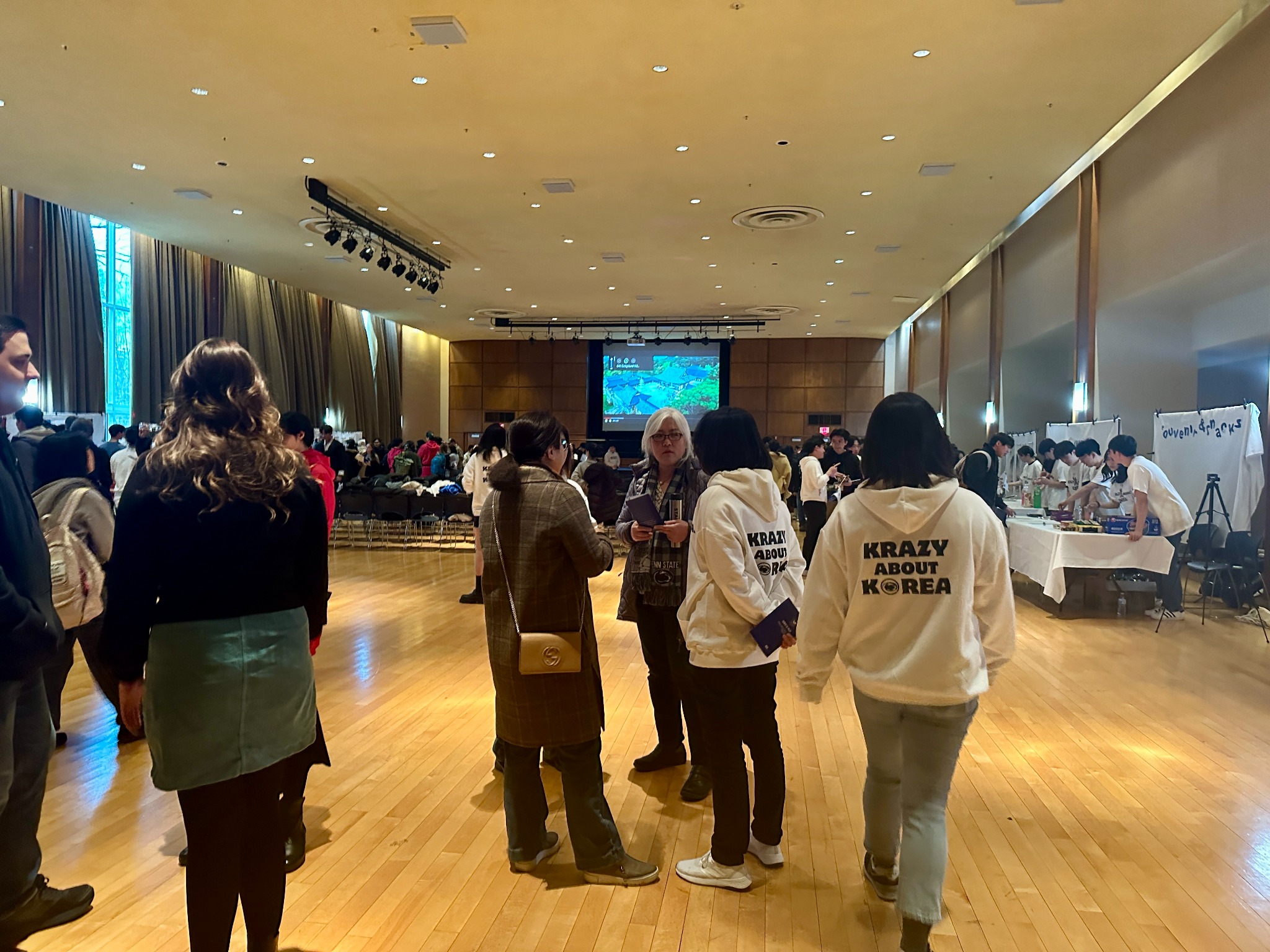
Korean population in State College shares lack of cultural opportunities
College kids looked on as children ran around waving Korean flags and holding ‘event passports’ turning what was typically a 20-year-old’s domain into a place for families to bond over a shared identity.
They greeted each other with hugs and smiles, speaking Korean and laughing with excitement to be in a space that felt more like home than any other.
Krazy About Korea, an event showcasing the culture and traditions, took over Alumni Hall in the Hub-Robeson Center Wednesday night, creating what Koreans considered a rare space to celebrate their heritage locally.
“Promoting the diversity and also the creativity of Korean culture, that's the important part,” Ok-sim Kim said. “I believe the event plays a very important role.”
Kim, the event’s coordinator, has been working to educate people about Korean culture in public events like this due to the absence of other opportunities.
In State College, Pennsylvania, a lack of diversity could play a role in this group feeling isolated from public spaces. According to U.S. census data, less than 1,000 people in town are Korean, making up less than two percent of the local population.
“There’s not many chances,” Kim said. “Krazy about Korea is the only and biggest event in the community.”
Families took advantage of this occasion, lining up over an hour ahead of time to celebrate their culture in the only way they could in the area.
Kim, who is also in charge of a local Korean school, sent the invite for the event home with her students. The students, who typically don’t celebrate their culture in the public sphere, showed up in large numbers.
“Most of the kids are from my school,” Kim said. “This is the greatest, all kids can enjoy Korean tradition.”
This notion didn’t stop with the younger kids – college students in the State College community also felt that there weren’t any other opportunities to express their culture.
Jihee Lee realized that she didn’t fit in with any groups locally and used Krazy About Korea as an outlet.
“I’m Korean American,” Lee said. “This is a good way for me to stay connected, like culture and helping out the Korean community.”
Not only could Lee not find other ways to stay connected with her heritage, but she also felt alienated from native Korean groups.
“I don’t really fit in with the international students,” Lee said. “It’s not very open. They stay close to themselves because they’re more comfortable with each other. I don’t really fit in with the Korean American group either.”
In its ninth year, Krazy About Korea was still the only widespread space for people to share in Korean customs and learning.
“Especially when it comes to getting involved, KAK is the only way,” Lee said. “There’s no other large gathering where you can participate in things like this.”
Not only were there no other events for Korean people to come together, but there also weren’t large spaces for others who don’t have Korean lineage to still learn about all of the cultural aspects.
The Korean Learning Club, the organization behind the event, is involved in creating opportunities such as this. While offering meetings for students to learn the language and culture, they bring it all to the public with Krazy About Korea.
Alan Arechiga, who is not of Korean heritage, has taken advantage of these meetings because he saw it as the only local opportunity to participate in a culture he once knew little about.
“Korean culture has been a good part of my life for the past two years or so,” Arechiga said. “It has become very important to me from this great learning club.”
When Arechiga decided he wanted to become involved in Korean events and culture, he couldn’t find any other opportunities for people like him.
“I went to this event last year, and since then I’ve gotten a lot more involved in Korean culture,” Arechiga said. “Obviously I can’t really group up with the international students or things like that, so this is the only place for everyone.”
Looking to the future, Kim anticipated a growth in opportunities for her students and others. She believed that educating others about Korean culture could lead to a spread of interest and discussion.
“I hope this inspires others,” Kim said. “I would love to see more people and events where people can share in Korean culture. It would be great to have more opportunities for us.”
It’s also not just about Korean families – people of all races and backgrounds showed interest in this learning opportunity, displaying promise for Kim’s hope that everyone can come together to celebrate each other’s culture.
“Everyone here is showing interest, no matter the background,” Kim said. “We have people eating our food, dressing up, having fun; it’s for everyone.”
Post a comment